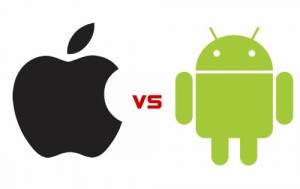
Lately, I have been asked one question more than any other question–heck, more than all other questions combined: “What phone should I buy?” Part of my day job is spent supporting computers, browsers, email, and network connections… And yet no one asks me about those things in passing. It’s always about phones. Nearly a decade after we first chuckled over the weird guy obsessed with his oversized CrackBerry… We’ve all caught the addiction. This is the era of the smartphone.
So… What should you buy?
Forget about BlackBerry and Palm. They have missed the window of opportunity for attracting developers, and a smartphone without software… just isn’t very smart. Microsoft has actually done some interesting things with the Windows Phone 7 user experience, but I would consider its new OS an “unknown” for the time being, as Microsoft has a tendency to produce neat gimmicks with very poor follow-through.
Really, then, this becomes a simple either/or scenario: “iPhone or Android?”
Of course, to many technology fanboys, that is no simple question, but rather, fuel added to the fire of their latest holy war. Apple hipsters will tout the iPhone’s ease-of-use; Google advocates will mention the open platform. iFans will brag that their demographic gets laid more, and Droid-heads will… Mention some cryptic thing about how nice “user intents” are, whatever that means.
I guess my overlap of fandom–I love my MacBook Pro, but I eat and breath Google Apps–has left me in a position to offer a fairly objective opinion: It really comes down to what your needs are. There are a few very important questions that should guide your decision, and otherwise it simply comes down to preference. Those questions, in order of importance, are as follows:
- Do you have a deep-seated hatred for AT&T? I couldn’t blame you… Their logo, until recently, did bear an uncanny resemblance to the Death Star. All signs point to Apple breaking free from its bonds with AT&T in the near future, but for now… Go Android.
- Is it important for you to have music, movies and photos with you on the go? Apple’s experience with iPods and iTunes give it a clear advantage, although Google is making plans to catch up in the next version of its OS. Still: Go iPhone.
- Do you rely on Google’s Gmail, Documents, Calendars, and other Google Apps? Fortunately, most of these apps perform equally well (or poorly) on both platforms. However, Apple has been known to block some Google apps in the past, and there’s nothing stopping them from doing so again in the future. And of course, nobody is going to know Google Apps–and Android–better than Google. Go Android.
- Is important for you to be able to customize and personalize your phone software and user experience? Apple likes to control the user experience, so they don’t allow apps to take over any of the default functionality of the phone. Tired of the default iPhone SMS interface? There’s an app for that–but good luck getting it to use your unlimited texting plan, or accessing it from your Address Book contacts. Android, on the other hand, gives users the freedom of choice. I run a custom home screen, lock screen, and SMS app. I have multiple map apps, browsers, and camera apps installed, and could easily set one of them as the “default application” for those duties. All of these apps, and the many UI elements provided by the Android OS, interact and play nice together. This is my single favorite feature of Android, and I wish there were a desktop OS that handled these interactions so elegantly. Granted, most people don’t require this level of customization. But if you’re a tinkerer… Go Android.
- Is it important for your phone to be extremely simple to use? Android has gotten knocked for having a less-than-elegant UI, but as of “Froyo” (version 2.2) I believe it is nearly as clean and user-friendly as the iPhone’s. I say “nearly”… Apple is the king of polish, and there are certain specific actions (e.g. selecting text on a web page) that are still just a million times easier on iPhone. These are features you won’t realize are missing on an Android phone until you need to use them–and many people never will. But if you want a stupidly simple smartphone, and I mean that in a good way: Go iPhone.
There are many extenuating circumstances that can trump this list, of course: carriers, coverage, keyboards, form factors… Android, being on multiple phones and carriers, is a bit more accommodating to these circumstances. But really, if you didn’t answer “yes” to one of the questions above, it comes down to user preference. If that’s the case, then congratulations are in order… Hopefully, whatever choice you make, you can remain a somewhat neutral party, avoiding the fanboy wars that will continue for a few years to come.
Caveat emptor: Android mileage varies greatly by phone manufacturer and carrier. Android phones from T-Mobile or from Motorola’s Droid series are generally safe, HTC-branded phones have some rather invasive UI customizations. The Samsung Galaxy line of phones have made waves as the “alternative to iPhone”, but in a cruel twist of fate, some stock Android features are just plain broken in the Samsung UI. And some cheaper phones are simply underpowered. In lieu of writing an article about “Which Android phone should I buy?”, I will happily do my best to field any questions left in the comments.